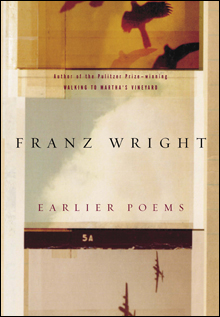
INDELIBLE: Earlier Poems collects the books and chapbooks Franz Wright published before his 2001 Pulitzer Prize. |
Poetry pours on in America. So, in honor of poetry month, these books have been plucked from the torrent. They range from the silly to the sublime, and offer so much pleasure that it is a wonder so few read poetry. No matter. They’re here for our enjoyment; 100,000 readers wouldn’t make the best of them any better.THIRD RAIL: THE POETRY OF ROCK AND ROLL (MTV Books/Pocket Books, 204 pages, $12, paper) is edited by Jonathan Wells with a foreword by Bono. Wells is a “widely published poet” and Bono actually wrote (or allowed his name to be used for) a foreword that quotes Bob Dylan, “he not busy being born is busy dying.” Bono further describes the poets in this book as “evangelists and hopeless addicts” of “the mysterious power of Rock and Roll” — in other words, the one-two craperoo to be expected from this sort of marketing approach to anthology-making. Who might buy a book like this? I have no idea, but whoever does will find good poems by August Kleinzahler, Thom Gunn, Kevin Young, Paul Muldoon, and a host of other poets who sing in no one’s doo-wop chorus.
MICHAEL O’BRIEN’s SLEEPING AND WAKING (Flood Editions, 80 pages, $12.95, paper) is the most alert book of poems I have read in some time, both alert-eyed and alert to street speech and the weights and measures of words. His turf is Manhattan’s West 20s, but in whatever locale he finds himself, like Thoreau in Concord, he travels a good deal. His poems, often set in short sequences, are as spare and subtle as those of any American poet writing today. At 68 years old, O’Brien already has many self-published books, and has translated poems from a number of languages. Now, the splendid Floor Editions has given him the well-made book he deserves. His poetry is first-rate.

Poetry magazine has used some of its Lily bequest to endow a prize for humor in poetry, which Billy Collins won. (If Henny Youngman said that, you might laugh. No one had to look very far to find him.) Perhaps the next time Poetry awards the prize they will look far enough to find PAUL VIOLI, whose new book, OVERNIGHT (Hanging Loose Press, 77 pages, $15, paper), should win every prize for humor in poetry on the basis of two poems: “As I Was Telling Dave and Alex Kelley” and “Counterman.” There is nothing light about Violi’s verse; his subject is the rich vitality of language, his nose so keen and ear so sharp that he finds it in places like Islip, New York, and when ordering a “Roast beef on rye, tomato and mayo.” Violi’s poems are fearless — humor courts failure at every turn — and beautifully constructed. He is one of a handful of American poets worth making a detour to hear read aloud.
EARLIER POEMS (Knopf, May 8, 272 pages, $26) is a compilation of the many books and chapbooks that FRANZ WRIGHT published before 2001, when he came into his own and was awarded the Pulitzer Prize. It is a work filled with pain, loss, and sadness — a collection of young man’s poems that often reads like a prayer to poetry. For long stretches, Wright is his only subject. Yet over the course of 245 pages, he delves deeper with arid but not desert-like effect, searching for what is described by one of his titles as “A Place to Be.” Here, Wright’s despair is so intense that one would expect him to hear his own voice, pause, and make light of it. Yet his humor is dry enough to be, as one line puts it, “The extension cord to the black house.” Readers who are just discovering Wright will have to read only a few pages to know if his poetry is for them. His voice is that indelible.
CHARLES NORTH’s CADENZA (Hanging Loose Press, 76 pages, $15, paper) continues his pursuit of what poetry can be. His poems are improbable and wholehearted engagements of a man’s imagination with life and language, which, here, are presented as harmonious entities. While North adeptly commands life-giving language in an eight-line poem like “My Ship Has Sails,” he is equally as adventurous with longer works like “Cadenza” and “Boul’ Mich.” His work displays a particular ability to turn on a dime, yet also allows a beautiful poem such as “Romantic Note” to remain that. There’s nothing fussy or experimental here, just freestanding poems of original and exhilarating character, devoid of overbearing description.